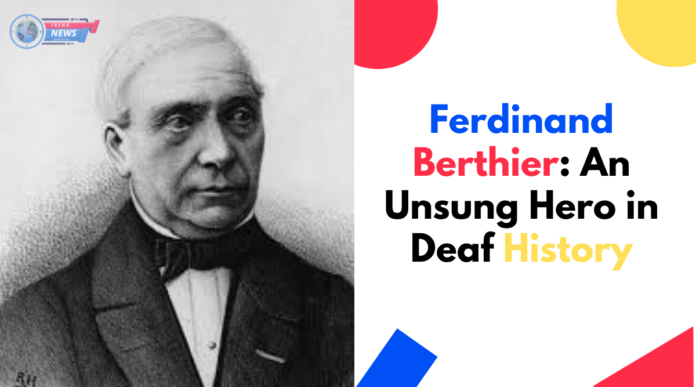Early Life and Education
The Deaf public has a rich culture with many protuberant figures, such as Gallaudet and Helen Keller. However, my preferred figure in Deaf past is one of the lesser-known but equally important donors—Ferdinand Berthier. Born at the start of the 19th century, Berthier was a deaf Frenchman who would leave an indelible mark on Deaf education and advocacy.
At the age of eight, Berthier was joined at the Nationwide Institute for the Deaf in Paris. This school was now globally renowned. Initially, he aimed to acquire basic vocational skills and literacy to become a tradesman. However, within two decades, Berthier transitioned from student to senior professor at the very same institution. His intellectual prowess, political organizing skills, and the influence of figures like Laurent Clerc and his teacher Roch-Ambroise Auguste Bébian shaped him into a major advocate for Deaf identity and culture.
Contributions to Deaf Culture
In Deaf History, Berthier is often represented by three distinct name signs. One highlights his baldness, another uses flat-handed O-circles near the ear to indicate he wore a hat—specifically, a French beret. The third name sign symbolizes his being awarded the Legion of Honor, France’s highest award. This was in credit of his activism for Deaf people’s language rights and their rights as equal countries.
Activism and the Silent Banquet
Berthier’s activism took many forms. In 1834, he held the first silent banquet. Initially, only deaf Frenchmen attended. However, in subsequent years, hearing people, women, reporters, and government officials began to receive invitations. By 1837, these events were officially hosted by the Central Society of the Deaf-Mute, which Berthier founded. This was the first organization to represent the Deaf community’s interests both nationally and globally. Silent banquets, inspired by Berthier’s initiative, continue to be held worldwide, keeping his tradition alive.
Literary Contributions
Berthier advanced his advocacy through writing biographies of key figures who supported signing over oralism for educating deaf students. He praised Bébian for his clear and rational educational philosophy. He also wrote positively about Sicard and Massieu but criticized their support of “methodical” signing, which conformed to spoken language conventions. In difference, Berthier praised Clerc for by “natural” signing. Notable publications by Berthier include “Histoire et statistique de l’éducation des sourds-muets” (1836), “Notice sur la vie et les ouvrages d’Auguste Bébian” (1839), and “L’Abbé Sicard… précis pasts unquestionable sa vie, ses travois et gets achievement…” (1873).
Lasting Legacy
Ferdinand Berthier died in Paris in 1886, but his legacy lives on through his work. His efforts significantly impacted the education and treatment of Deaf individuals worldwide. Berthier grew up in an era when deaf-mute individuals were considered ‘handicapped’ at best and ‘stupid’ at worst.” Yet, he grew to become a significant figure who drastically improved the future for Deaf people globally. His work helped Europe and, consequently, America to make great strides in Deaf education, even against the growing popularity of oralism.
Conclusion
Ferdinand Berthier is a pivotal yet often overlooked figure in Deaf history. His commitment to improving the exists of Deaf individuals done education and support is inspirational. Berthier’s life is a evidence to the impact one person can have on making expressive change and advancing the rights of relegated communities. His story endures to inspire and form the future of Deaf nation and education.
FAQs
1. Who was Ferdinand Berthier? Ferdinand Berthier was a 19th-century French deaf educator, intellectual, and political organizer.
2. What did Ferdinand Berthier contribute to Deaf education? He founded the Central Society of the Deaf-Mute, organized silent banquets, and promoted the use of sign language in education.
3. What are silent banquets? Silent banquets, first organized by Berthier in 1834, were social and political events that highlighted Deaf culture and included both deaf and hearing individuals.
4. How did Berthier support sign language? He advocated for “natural” signing in Deaf education and criticized methods that conformed to spoken language conventions.
5. What is Ferdinand Berthier’s legacy? Berthier’s bequest includes important advancements in Deaf education, support for Deaf rights, and the raise of sign linguistic.




